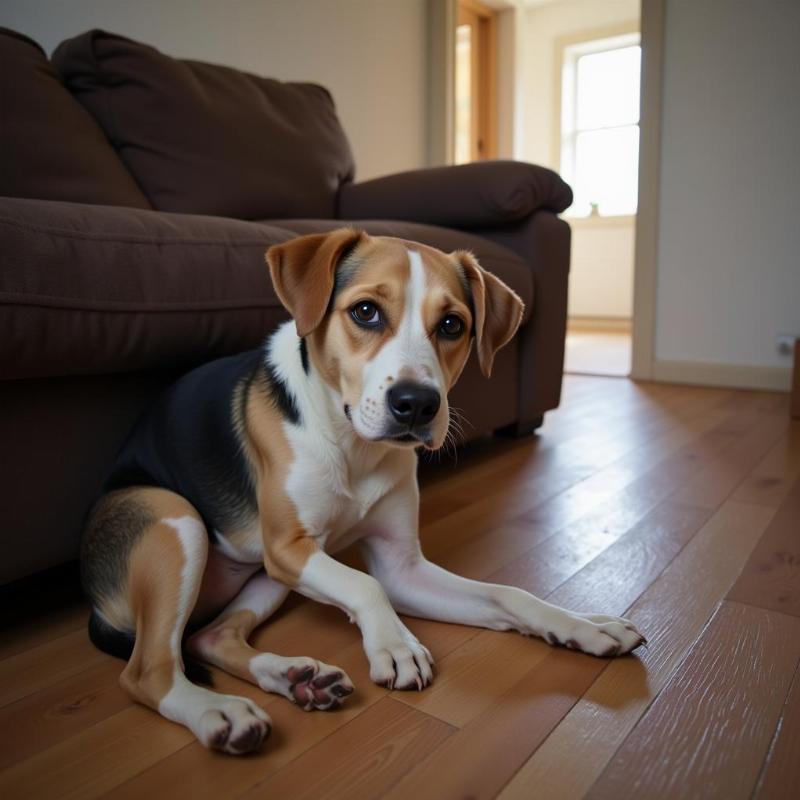Dealing with a dog who repeatedly pees on the couch can be incredibly frustrating. But before you get discouraged, know that this is a solvable problem. Understanding why your dog is peeing on the couch is the first step to effectively addressing the issue and reclaiming your sofa. This involves considering medical reasons, behavioral issues, and even training mishaps. Let’s explore the causes and solutions to help you and your furry friend achieve a happy, accident-free home.
Understanding the Root of the Problem: Why Does My Dog Pee on the Couch?
Several reasons can contribute to your dog’s inappropriate urination habits. It’s crucial to rule out medical issues before addressing behavioral factors. A visit to your veterinarian is recommended to check for urinary tract infections, bladder stones, or other medical conditions that could be causing discomfort and leading to accidents.
Medical Reasons
Conditions like diabetes, kidney disease, and hormonal imbalances can increase thirst and urine production, making accidents more likely. Senior dogs, especially, are prone to these conditions, which can often be managed with proper veterinary care.
Behavioral Factors
If your vet gives your dog a clean bill of health, the cause is likely behavioral. Anxiety, territorial marking, submission, or even excitement can trigger inappropriate urination. Puppies still learning house-training are also more prone to accidents. Sometimes, the simple comfort and absorbency of the couch can be appealing to a dog, especially if they’ve had accidents there before and the scent lingers.
Effective Solutions to Stop Your Dog from Peeing on the Couch
Once you’ve identified the underlying cause, you can implement effective solutions.
Thorough Cleaning is Crucial
Enzyme-based cleaners are essential for eliminating the urine odor, which can attract your dog back to the same spot. Regularly cleaning your couch with these specialized cleaners will discourage repeat offenses.
Retraining and Positive Reinforcement
Consistent house-training is key. Take your dog outside frequently, especially after waking up, eating, and playing. Reward successful potty breaks with praise and treats. Avoid punishment, as it can worsen anxiety and exacerbate the problem.
Managing Anxiety
If anxiety is a factor, creating a calm and predictable environment can help. Consider using pheromone diffusers, calming supplements, or consulting a certified dog trainer or behaviorist for professional guidance.
Addressing Specific Scenarios
What if my dog only pees on the couch when I’m away?
This suggests separation anxiety. Desensitization training and providing your dog with engaging toys or puzzles while you’re gone can help alleviate their anxiety and reduce accidents.
My dog pees on the couch even though he’s house-trained. What’s wrong?
Sudden changes in routine, new additions to the family, or even moving to a new home can disrupt a dog’s established habits. Reinforce house-training and provide extra support during these transitional periods.
 Dog Peeing on Couch: Separation Anxiety
Dog Peeing on Couch: Separation Anxiety
Conclusion
Stopping your dog from peeing on the couch requires patience, consistency, and a tailored approach. By addressing the underlying cause, whether medical or behavioral, and implementing the right solutions, you can reclaim your couch and enjoy a harmonious relationship with your furry friend. Remember, seeking professional help from a veterinarian or certified dog trainer is always a good option if you’re struggling.
FAQ
- How can I clean dog urine from my couch effectively? Use an enzyme-based cleaner specifically designed for pet stains to eliminate the odor and discourage re-offending.
- Is it ever too late to house-train a dog? No, it’s never too late. Older dogs can still learn with patience and consistent training.
- What are signs of a urinary tract infection in dogs? Frequent urination, straining to urinate, blood in the urine, and licking the genital area are common signs.
- Can I use regular household cleaners to clean dog urine? Avoid using ammonia-based cleaners, as they can smell similar to urine and reinforce the marking behavior.
- Should I punish my dog for peeing on the couch? No, punishment is ineffective and can worsen anxiety. Focus on positive reinforcement and addressing the underlying cause.
- How can I tell if my dog’s peeing is due to anxiety? Other signs of anxiety may include panting, pacing, excessive barking, destructive behavior, and clinging to their owner.
- When should I consult a veterinarian about my dog’s peeing problem? If the problem persists despite your efforts, or if you notice other symptoms like lethargy, loss of appetite, or increased thirst, consult your vet.
Related Articles
- how to stop my dog from peeing on my couch
- how to stop my dog from peeing on the couch
- how to stop a dog from peeing on the couch
- why does my dog pee on the sofa
Beautdogs.us is your premier online destination for all things dog-related in the US. We offer expert advice on dog breeds, care, and product recommendations. Whether you’re a new dog owner or a seasoned pro, Beautdogs.us provides trusted, comprehensive, and engaging information to help you navigate the joys and challenges of dog ownership. Contact us today for personalized advice and support! Email: [email protected], Phone: +1 501-555-7529. Visit us at Beautdogs.us for more helpful resources.